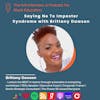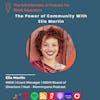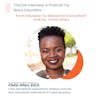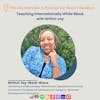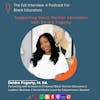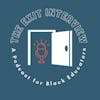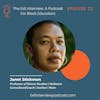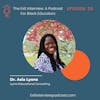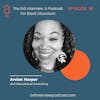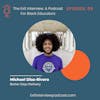
Slow Burn with Enola Garland
In this episode of, The Exit Interview, Enola Garland found her way into the classroom as an early childhood educator. She quickly realized that working with three and four-year-olds was what she was meant for. After years in the ECE space and with COVID-19's impact on her students, colleagues, and herself along with racism-related stress in the workspace after the murder of George Floyd she knew she had to leave. Listen as Enola shares her story and what she is doing now that continues to support early childhood educators across Colorado.

Memorable Quotes
Enola: But what really got me is after he was expelled, they used his photo in a letter what is it called? An appeal letter for donors. And he was, one of maybe two or three black children in the whole school.
Enola: What really kept me in it for so long is that you never wanna leave the kids. I think that people stay in the classroom for longer than they ment too because they don't want to leave them they don't wanna leave the students. And it's [00:29:00] not that we don't think that other people are capable, it's just that you've put so much work and heart into it and you just worry about them.
Enola: I think that [00:30:00] it took me a while to recognize that and get to a point where I was , okay, I have to go. I realized I was the problem. I was becoming that grouchy teacher that wasn't hanging out with kids. I wasn't sitting down on the floor playing with them as much. I wasn't putting my all into my lesson plans, into my activities, and I just knew that if I stayed, I would be doing the children in my class a disservice.
Enola: Black boys make up 18 or 19% of enrollment in preschool programs, but they account for over 40% of the suspensions and expulsions in preschool program. And so I think thinking about that and then going back and looking back at policies and asking, how is this happening?
Enola: The hourly wages for white women in early childhood, grew 92 cents from 2012 to 2019, but wages for black women dropped by 40 cents and then the wages for Hispanic women [00:35:00] dropped by over a dollar.
Resources From This Episode
https://www.americanprogress.org/article/still-underpaid-and-unequal/ -Formal child care and early education environments are a significant part of many young children’s development. Around two-thirds of children younger than age 6 in the United States have all available parents in the labor force,1 making care arrangements a prominent aspect of families’ daily lives.
https://ocrdata.ed.gov/assets/downloads/crdc-DOE-Discipline-Practices-in-Preschool-part1.pdf - This infographic discusses disparities in suspension of Black and Native preschoolers.
https://www.scientificamerican.com/article/half-of-the-250-kids-expelled-from-preschool-each-day-are-black-boys/ - This article in Scientific American discusses the disparities in suspension of Black boys.
https://cscce.berkeley.edu/publications/brief/racial-wage-gaps-in-early-education-employment/ - This article written by the Center for the Study of Child Care Employment discusses the pay gap within early education systems.
https://cscce.berkeley.edu/workforce-index-2020/the-early-educator-workforce/early-educator-pay-economic-insecurity-across-the-states/ - This article written by the Center for the Study of Child Care Employment focuses on the early educator pay gap and economic insecurity in the U.S.
https://www.catalystcalifornia.org/blog/tracing-the-roots-of-systemic-racism-in-the-us-early-childhood-system - This article Written by Emma Watson of Catalyst California focuses on the undervaluing of ECE educators in the U.S.
Colorado Association for the Education of Young Children – This website provides information about the ways that COAEYC is supporting ECE educators.
Responses to Racial Battle Fatigue – This document defines the different types of racism-related stress and the three types of responses to racial battle fatigue.
Other Episodes You'll Enjoy
Coming Back Different by Jacci Cradle
5280 Freedom School with Branta Lockett
First of all.... have you signed up for our newsletter, Black Educators, Be Well? Why wait?
Amidst all the conversations about recruiting Black educators, where are the discussions about retention? The Exit Interview podcast was created to elevate the stories of Black educators who have been pushed out of the classroom and central office while experiencing racism-related stress and racial battle fatigue.
The Exit Interview Podcast is for current and former Black educators. It is also for school districts, teachers' unions, families, and others interested in better understanding the challenges of retaining Black people in education.
Please enjoy the episode.
Peace out,
Dr. Asia Lyons and Kevin Adams
Dr. Asia Lyons: Welcome back to another episode of the Exit interview with me, Dr. Asian Lyons, and my favorite co-host, Kevin.
Kevin Adams: There we go. How you doing Asia?
Dr. Asia Lyons: It's good to be here. I can't complain. Kevin's out here living his best life. Kevin, and today I'm with our guest. Enola Garland is here to join us and tell us her story , her exit interview. Welcome to our podcast.
Enola Garland: Thank you. I am very excited to be here.
Dr. Asia Lyons: Yeah. We realized today, we realized just a minute ago before we came on air that Enola has already heard our podcast and that's how we met.
She messaged me on LinkedIn a while ago about some great projects, and then she said today , Hey, I listen to your [00:01:00] show and it tells me when you all are coming up and pinging when the shows drops. We just told her, now it'll be you. We'll be hearing your story.
Tell us how did you decide to go into education.
Enola Garland: So I usually tell people that I fell into it. When I was a kid, I was that kid that was the teacher's pet. I wanted to be a teacher. And then I remember in sixth grade we did a career day and I found out how much teachers made and I was like, no.
But in 2013, I was having a really hard time finding a job. I'd moved out to California and my best friend's brother had worked at a before and after-school program for children at an elementary school. And he said, you know what? You have a lot of patience. I think you should try it.
So [00:02:00] I did and I loved it. I usually was put with the younger kids, kindergarten to second grade and those were the kids that I really clicked with. And then I got to pick up shifts in the preschool room that they had on-site as well. And I just absolutely loved that age group.
I thought it was just such a fantastic opportunity to get in and help them build those basic skills before they went into elementary school. Cuz I would work with some of those kindergartners and there were things that they didn't know, writing their name that I felt, oh wow, I wish I could go back and help you with that. And so when I moved back to Colorado, I had actually grown up here and moved back here in, what was it? 2014, I believe, 2015. I saw a job opening at a Headstart program in Colorado Springs [00:03:00] and I thought, you know what? I'm gonna go for it. And it was probably the best career move that I feel I've made.
As far as things that I've done in that early childhood space. Anybody who's familiar with Headstart, I think they would know that just the quality of the program is amazing. The amount of training that was given was stellar. It was stuff that I took with to me, to every program that I went to and I just really appreciated their philosophy on that two-generation approach between, the program and the child and the family, and just that idea that you can't separate the family from the child.
If you're gonna help the child, you have to help the family as well. And I think that was just, it made so much sense to me. And another thing that I saw that I really appreciated from them was just a willingness to invest in their teachers. I don't know if it's this way across, all Headstart programs, but the one that I was [00:04:00] in, it would pay for school.
And however long you stayed at the program you owed less. So if you stayed one year and then less, you would have to pay back 75% of, whatever they paid. If you stayed two years, 50% and so on. And I just felt that kind of investment, it means a lot. It means a lot as a teacher. Honestly, as an employee of any program or company or organization, when your employer says, you know what?
I believe in you, I want to invest money in your education so that you can do better it made me feel less I'm not a name on a schedule. They care enough about me to put this money into my education, knowing that, someday I might move on and I get to take that with me to the next.
So that was my start in early childhood education.
Dr. Asia Lyons: And I have to say I think we all, we've maybe said this at one time in our lives, we all know as educators what [00:05:00] grades. We can stick with. I knew that third was the minimum, an eight-year-old to sixth grade. And, I did work study when I was in my as my getting my associates.
I did work study at a preschool or a childcare center. It's two to four, two to five. And I loved it, but I knew, that it was best that I stayed with the upper grades. It was just my style.
Enola Garland: That's so funny to me because third grade is my cutoff. You guys know too much. You think you know too much.
They start to get really sassy. I remember at that before an afterschool program, having a third grader tell me that my nails were ratchet. Cause I, had my chip nail polished. I need to be with some kids who have less language. The honesty or a little more honest, younger kids are honest, but they don't notice the same kind of things that older kids notice. They're not gonna look at my [00:06:00] nails or anything like that. So I really appreciated the littles and with preschoolers, my sweet spots, three to five year olds, four year olds, I love them. They're so much fun.
It's amazing to watch them discover new things and they're so funny, the things that they say and the conversations that you can have with them. They're so independent. I really adore them. Three-year-olds, it starts to get a little iffy. Cause you can, you get the three-year-olds that or four-year-olds and then you get three-year-olds that are still two-year-olds.
Yes. And so that's a little scary. And then if infants, toddlers, I will come by and say Hi, I will hold a baby. But that's as far as I can go. I can't stay in a classroom for more than 15 to 20 minutes before I'm crying and freaking out. Yeah. Everybody, I think has their age group.
Kevin Adams: I definitely have big props for all the ECE teachers.
Y'all do the real work because [00:07:00] cuz they come in literally with nothing for school, no training. I'm lucky, sixth grade. They pretty much understand how school works, and the basics of what you need to get through the day.
ECE y'all still clean up accidents and stuff and help people make it through the day. So shout out to y’all.
Dr. Asia Lyons: Shout out.
Enola Garland: Absolutely. And I think that's one thing that some people, if they're not familiar with early childhood, they might not recognize that I think there's still this perception that early childhood is daycare and the kids are just playing all day.
Oh no. But really we are building that foundation for that child to be successful in school. Real work. You know that child in preschool, even in their toddler rooms, they're learning how to sit down at circle. They're learning how to listen and follow the next steps and regulate their feelings.
If the child cannot regulate their feelings, how do you expect them to go on and learn in kindergarten? If they can't sit down, if they can't cooperate with their classmates. It's such [00:08:00] an essential piece to just a child's a person's success, honestly, in school for sure.
Kevin Adams: I agree. So important. So Colorado Springs is where most of your career has was teaching has been?
Enola Garland: Actually, the bulk of my career has been up in Fort Collins.. So I stayed, I was with Headstart for maybe about one year or two years, or year and a half. It was a really weird time.
I was , about to get a divorce, so just, there was so many things happening and little complex. Lots of life things and working. Childhood traumas and just all those things that, you know, honestly, teaching I think really helped me with, I felt I was teaching kids social-emotional curriculum and I was learning things myself.
Oh, nobody taught me how to do that. [00:09:00] We would have these exercises where, you teach the kids, okay. When you're feeling really angry, you put your hands on your tummy and you take a deep breath and you say, I feel angry. And I would recognize that nobody in my childhood taught me how to express my feelings, but I digress.
I moved up to Fort Collins and I worked in a for-profit center for a year. I was honestly one of the first employees to work there. It had just opened and it was a corporate center with headquarters in Florida. And it was not for me, it was not a good fit. There were just lots of things that I found not developmentally appropriate, just in what corporate wanted, I felt went against what I knew as a teacher I was supposed to do.
In Colorado, we have a quality rating system called Colorado Shines, and it was a program that they could not participate in. Their program philosophy is just [00:10:00] so different. I'm sure you guys know quality means different things to different people, and I think that was a program for parents whom, quality to them may be academics.
And I think in early childhood we have shifted to really focusing on social-emotional development and we're not doing workbooks and things like that in the classroom. That's not really, that's not really where you want your kids to be at that age. So I ended up finding a community-based program and that was my home for five years.
And I guess that's probably where the bulk of my experience in one place ended up. It was a great program.
Kevin Adams: We are all black educators so tell us about your experience as a black educator and how that impacted your work.
Enola Garland: I remember hearing I don't know if it was, I think [00:11:00] it was a statistic. I really can't remember where I heard it, but I remember reading about how some people don't have black teachers until college. There's a majority of people who go through their entire school career without having a single black educator. And for me, it became important to be that person for somebody and not have to wait to college to see somebody who looks like them in the classroom.
Working up in Fort Collins, which is a very predominantly white area. It was definitely an experience. Yeah, I can say with full confidence that I was probably the only Black person that a lot of those kids interacted with, especially on a daily or frequent basis. But I think that opened up a really great opportunity for conversations with those children [00:12:00] that wouldn't have happened otherwise.
I've had kids ask me when I'm washing my hands, why don't your paint, why doesn't your paint come off? So that's an opportunity to talk to them about, actually this is my skin color. That's your skin color.
During the summers, my preschool classroom would turn into a school-aged summer program. And one of the kids told me that she had learned that year about slavery and about Jim Crow and all these things. And she asked me, she's would you have been able to be my teacher if we were in the fifties? And I thought about it and I was like, honestly, probably not. So they had a safe person to ask those questions to and to make those comments.
Cause I feel, their parents sometimes don't know how to handle that. Cause, it's such a sensitive topic. I feel there are a lot of white parents who don't feel comfortable talking about race with their kids. They might not know what to say, it's nothing against them.
One of the kids that I had interacted with made a comment where he just looked at me, he goes, [00:13:00] you're black, your arm is black. Is the rest of you black? And I said, yeah I am, my arms are brown. My face is brown. I was like, my whole body's brown. What about you dude? What color are you? And we had that conversation and I jokingly told his mom about it because I honestly, I thought it was cute.
I thought it was a funny moment for me. I told his mom. She was horrified. And then she shared that, he does that in church where there's a black lady over there and she doesn't know how to handle that. So I felt good that I, in my position, I could be that person where they could have that conversation and they can say those comments too, and instead of being hushed, instead of being told, we don't talk about that, or, just not being addressed.
We can have an easy conversation where it's not, there's nothing shameful about talking about somebody's skin color or noticing that somebody has a different skin color. It's just a fact of life. And we talked about it and then we moved [00:14:00] on. And as far as being a black early childhood provider in a predominantly white program in town, I felt that was a, I don't wanna say it was a responsibility, but it was definitely a good opportunity.
Kevin Adams: Yeah, definitely. So I you share this, you're calling to ECE, and you find that, it sounds like you had a great training ground, in your Headstart program that equipped you with a lot of the skills that I think a lot of educators wish they would get in all training programs and support.
You moved to a community up in Fort Collins, had one experience, but found a community that, you seem to be thriving in and having positive experiences. So let's get to, I think one of the critical questions, because the exit interview, your story I feel like we're, it's a very bright day and the sun we're going down the road and it's shining, it’s looking really good.
Dr. Asia Lyons: ECE style, ECE [00:15:00] style.
Kevin Adams: We're singing. Circle time, allthet snacks are handed out. Everybody's sharing and all the good stuff is happening. So what brought you to this point where you're on The Exit Interview and you've left the classroom and left all of that wonderfulness, where does it all come crashing down?
Enola Garland: I feel it might have been a little bit of a slow transition. I think that there was a little bit of a culture shock for me leaving my Headstart, my federally funded Headstart program and going into a community-based program where we did not have the same kind of resources.
I didn't have speech pathologists coming into my classroom every day. I didn't have OTs coming in, behavioral therapist. I lost all of those resources that I thought were standard. For anybody who doesn't know it's not if you are not in a school district, then you're probably not getting those services.
Throughout Colorado, we have early childhood [00:16:00] councils. They are organizations that are actually in state statute and they coordinate birth to five services across the state. We have 35 councils that cover all 64 counties. And a lot of those councils do have programs where for example, they have early childhood mental health consultants that can go out to community programs, but there are not many consultants.
So you know, they have very large caseload. And that's just one provider. There's still those kids that are gonna need speech. So being in my classroom especially, I was in a community-based nonprofit program that really aimed to serve children from low-income families.
You tend to run into a lot of children who have had delays that maybe haven't been caught by previous teachers or by parents, maybe because their child wasn't in childcare or sometimes you have younger parents who just don't know. There are so many things, so dealing with I [00:17:00] don't wanna say dealing with that, but that was a challenge that I saw throughout my time there.
And toward my last few years at that program, I was then in a Colorado preschool program classroom, or CPP, which is a state-funded preschool program. And we did this through a partnership with the school district. So we were not in the district, but the district funded that classroom. And so you have children who have a lot of risk factors and with risk factors, you tend to get children that have a lot of delays and disabilities. And once again, I was seeing all these children falling through the cracks and not being able to get services for them. Even though our classroom was a district partnership, because we were not in the district, they would not send us support when we needed it.
So we had these kids who, were flagging as this child needs an I E P before they go to kindergarten. These kids [00:18:00] need support and I just wasn't able to get it. And that, I think was probably the catalyst, that was part of the burnout. I think there's just a stack of things that were going on.
I think that was really probably the last straw, or at least what started me actually thinking about leaving the classroom was the summer of 2020. Spring summer of 2020, so our program had closed for about seven weeks and we ended up going back in May. So we were one of the only programs that were open.
And we're operating under a lot of fear. Nobody knows, if we're gonna get sick, we didn't even have a vaccine yet. We're all overworked and underpaid and, the parents were very on edge and I felt that a lot of I felt honestly, a lot of parents were being very unfair with us.
They were very upset about policies that [00:19:00] really had nothing to do with us. They were health department things. And then as the pandemic went on, which I don't know if it's, I, it's not finished, right?
Dr. Asia Lyons: No, it's not.
Enola Garland: We started to notice that the kids were really starting to show the effects of the inconsistency in care.
Of, not being able to see people's lips when they're wearing masks, and that is not me complaining about wearing masks. I am a hundred percent for it. That is not a complaint. It is just an observation. But it sometimes it was feral kids, honestly. You'd have kids come in and they had never been in childcare before, or they had been in five different childcarers because centers kept closing down and parents needed to really quick place put their kids.
And so things were just so inconsistent. We had a classroom that was just burning through teachers. Every couple of weeks they had a new teacher. How do you cope with that when you have a different caregiver every couple weeks? And so we were seeing a lot of behaviors. We were seeing a lot of delays, especially speech delays.
And in my four-year-old classroom, I had probably 30% of my kids were still in diapers. And that was very new for me. Usually you have a few kids potty trained when they're ready. But these kids were nowhere near being ready and those things were piling on.
But once again, we didn't have support for those kids. As you guys know, summer 2020, things were not good. George Floyd was murdered. That was in 2020, correct? Yep. And things with Black Lives Matter started to move forward and it was getting a lot of attention.
A lot of people were sitting at home and had more access to this [00:21:00] information. And admittedly I was probably spending a little too much time taking in a lot of the news that was going on, and it was really starting to affect me. And what I noticed was that I felt some of my white coworkers were avoiding.
Especially if they knew I was talking about it. I had one instant instance where a teacher who I thought I'd been really good friends with, had asked me how I was doing, and I am not good at small talk. I just not, and I told her, you know what? I'm not doing well and I. Started telling her, I'm feeling a little scared.
I'm feeling a little frustrated that this is going on, that people like me are being murdered because they look like me. I'm scared for my future. Maybe I offloaded a little too much, but after that girl didn't talk to me for the rest of the time that she worked there.
I got [00:22:00] uninvited to Chili's.
Kevin Adams: Not Chilis. Oh, they cut you off from Chilis?
Dr. Asia Lyons: Not from the fajitas. Not from the fajitas.
Enola Garland: And you guys, it was right when restaurants started opening up again, I was so excited. I was like, oh, I'm gonna go places. This is cool. They came back with so we can only have some, this many people at our table and there's too many, so you can't come.
You invited me first. I really started to look at, I guess look at myself and look at my place and my community, and I started to just feel a little weird about it. And I think what really got me was a colleague who was handling social media for that program, [00:23:00] and she came to me and she asked me, she was like , oh, I'm gonna ask you because I'm black, which is implied.
I see everybody's posting, things about Black Lives Matter and that they, messages to support should we do something, And I was like , if you mean it, I think you should do it. You do have two black kids that go to the school.
Dr. Asia Lyons: You have more black kids. Yeah.
Enola Garland: You have some kids that go to the school, they'll see that. And it does mean something to them, but if you mean it, it has to be sincere. So we had that conversation and then a couple days later, I asked her about it and she said, oh, I decided not to do it. I just don't wanna rock the boat.
And I felt some kind of way about that because, I had felt tokenized in the first place for being asked. I'm gonna go ask the black teacher what I should do about Black Lives Matter. Yep. You could have asked a couple people. I dunno. And I could be reading too much into it. I’m not sure.
Kevin Adams: You’re not. Don’t gaslight yourself.
Enola Garland: Thank you, Kevin. Thank you. Ok. Yeah. I don't wanna minimize. So I was already feeling so nice about that and then for me to give you my opinion and tell you that I am looking at everybody's social media right now and I see who's saying things, who's not saying things, who's letting their racist auntie keep staring on conversations on their Facebook.
People do notice that. And then for her to say that she didn't wanna do that cause she didn't wanna upset. That made me feel very frustrated and it didn't make me feel valued at all. And what really, and I feel this is a very long story.
Dr. Asia Lyons: Yeah. We're here for it. We're here for it.
Enola Garland: That’s another just I don't know, pin in the balloon.
I can't even think of an analogy right now cause I'm getting upset just thinking about it. But, so all this is going on in my brain, and then I have this one child and this in my class. And this ends [00:25:00] up being just the intersection of all of these things that I've just been complaining about.
I had this boy who was black, he was globally disabled and we had been fighting for support for. And finally,
Dr. Asia Lyons: can you pause one second? What did you say? Back up? What kind of disabled,
Enola Garland: Globally delayed.
Dr. Asia Lyons. Can you tell us what that is? Yeah I'm sorry. He just, everything physically, cognitively, speech wise he had a lot going on.
He had a very rough life. And he was finally in a space where he had consistent caregivers. He was a very sweet kid and with some support from his teachers, he was able to start catching up. This kid who was four years old, almost five, came into my class with zero language.
All he could do was cry and scream, and by the time by the time he left, which I'll get to, he was telling people, [00:26:00] he told our aid, stop, I don't like it when you do that. So he was progressing. He was making progress and I truly think it was because he was with people who cared. I mentioned earlier that my classroom turns into a school-age program in the summer, and he ended up being put in a classroom.
Somebody who had heard about his behavior before she got him. And I felt like she had formed an opinion about him before he got in there. And he did not last two weeks before he was expelled for the program. I felt it was such a disservice to him because he had been making progress. I'm trying to think of, I just spaced in my brain. But I just felt like he had so many disadvantages, and I can understand saying, we're not equipped to handle this child. But I think we were at a point where we were and we had been making progress with him and he was a couple months away from being in [00:27:00] a headstart classroom.
He had gotten into a district classroom where he would be getting those full services. So he needed that childcare during the summer and he lost it, and he lost his slot. And that was really upsetting for me, and it was something that, I was really upset about, honestly, didn't really forgive my program for as much as I love them.
I'm so salty about that. But what really got me is after he was expelled, they used his photo in a letter what is it called? An appeal letter for donors. And he was, hold on, one of maybe two or three black children in the whole school and. Don't want to say that. That was intentional, it was, it felt very shady and it felt very underhanded, and it's you guys are gonna try to make money off of this boy.
When you didn't give him a chance, you didn't set him up for success. [00:28:00] I'm gonna be honest, I was disgusted.
Dr. Asia Lyons: Can I just pause? Okay. Yeah. So expelling a child, a four-year-old, you said from school tokenizing this child using his photo. All the pieces, the silence, that's a lot. You said this was the slow burn.
You had a long candle. You had a very long candle.
Enola Garland: I did. Yeah. I think, it's hard because I really loved that place and I feel anybody who listens to this who knows me is probably gonna put two and two together and figure out where it is. But, it is what it is. But yeah I think.
What really kept me in it for so long is that you never wanna leave the kids. I think that people stay in the classroom for longer than they ment too because they don't want to leave them they don't wanna leave the students. And it's [00:29:00] not that we don't think that other people are capable, it's just that you've put so much work and heart into it and you just worry about them.
And I think in early childhood in particular, I don't know how it is in elementary ed.
Early childhood is a broken industry. It's very hard. Compensation is low. It can be hard to staff and so sometimes you might get stuck in situations where if it were any other kind of job, you probably wouldn't stay.
I'm trying to think of a good way to explain it, but I think that people become complacent because they know that other people have it worse, but you don't have to be okay with your situation just because it's better than somebody else's situation. Your situation can still be not okay for you.
I think that [00:30:00] it took me a while to recognize that and get to a point where I was , okay, I have to go. I realized I was the problem. I was becoming that grouchy teacher that wasn't hanging out with kids. I wasn't sitting down on the floor playing with them as much. I wasn't putting my all into my lesson plans, into my activities, and I just knew that if I stayed, I would be doing the children in my class a disservice.
And so I. I heard from a friend about a job and I ended up applying. I actually applied for three jobs and had interviewed that week, and I got the one that I really wanted. So that was it. That was the end of my time in the classroom.
Dr. Asia Lyons: When we get back, we'll talk about some ideas you may have around making sure that black educators stay in the classroom.
We'll talk about this job that you received and what brings you joy.
BREAK
Dr. Asia Lyons: So before our break, we had a chance to talk about all the ways that Enola was dealing with some of the childcare issues during Covid. What was happening in your classroom. What was happening in the space with educators. Being uninvited to fajitas at Chilis. We're making fun of it, but that's serious though. That tells you something, that silence. We see it so much that folks on our podcast talk about the people in their jobs.
Just stop speaking to them, walk past them, don't acknowledge them, don't invite them out anymore. Just all the things. And so what you're saying, we've heard this so many times. So our question is tell us if you believe you have some ideas, what do you think would be some ways that programs like the one you spoke about and that the ones that you worked [00:32:00] in can keep black educators?
Enola Garland: That is such a big question because there's such a workforce crisis in early childhood.
But I do think that this issue does go a little bit deeper beyond or beyond compensation, which is, that's usually the talking point for the workforce crisis in early childhood. I think one thing I don't think that early childhood professionals are always seen as professionals, and I think that's a big part too.
Being sure that, programs and other educators who aren't in the ECE space look at those providers, the professionals that they are. They know what they're doing. They have the expertise. [00:33:00] They're, many of them are very educated. I think that there's an idea that you can just walk into a classroom and be a teacher and be in there by yourself, and that's really not the case there.
There is there at minimum college. College classes and work experience and just time that goes into being qualified to be a lead teacher in a classroom. So that's one piece, but I think that's very broad. Diving deeper into the compensation piece, early childhood teachers in America make are barely above federal poverty wages.
And as you can imagine that there is a wage gap that exists between white educators and black educators. So you already have people who you know at best, when you're making the most, you're probably just still barely above. That federal poverty line. I was reading a study from the Center for American Progress, and they were saying [00:34:00] that when accounting for inflation, early childhood teachers actually made less in 2019 than they did in 2012.
They were making less in 2019 than they were in 2012. And the wage gap between white teachers and I would assume, I believe it's white women And I'm sure for, I would assume for the purpose of the study, that it is cisgender women, but the wage gap between white women and black women in early childhood increased from 2012 to 2019.
So you would think that with all the equity and just everything that we've been talking about, that would've gotten better. But I learned that got worse. And so you have I actually took some notes cuz I was a little appalled by it. The hourly wages for white women in early childhood, grew 92 cents from 2012 to 2019, but wages for black women dropped by 40 cents and then the wages for Hispanic women [00:35:00] dropped by over a dollar.
So it's wow. Not the gap didn't just sustain itself. It widened that. And in our early childhood teacher, or excuse me, in early childhood education educators who work with infants and toddlers make usually make less money than providers who work with preschool teachers. I think there's a national average of $10 less an hour than providers who work with preschool aged children.
However, A majority of the black women who work in early childhood work with infants and toddlers. So there's just so many areas for disparities there because it's not just Infant teachers and preschool teachers, but then it becomes black and white, and every time you find those differences, that wage gap grows even larger.
With that said something that, programs and school districts need to do is assess the scout the salary scale in their programs, look at the salaries and determine, Is there [00:36:00] something unintentional going on? I'm not saying that it's intentional, if you're looking at your wages, are you seeing that your black educators are being paid less than your white educators?
If so, there needs to be a reconstruction of how you how you pay people. And I think with that too, Is, something I mentioned about Headstart and one of my loves for them was that their invested, their willingness to invest in their teachers. And I think that needs to happen more frequently, and there are ways to do that without breaking the bank or compromising, the funding of your program.
There are programs that exist. There's one called the Teach Scholarship, which the program pay. 90% of your tuition excuse me, the scholarship pays 90% of your tuition. Your center pays 5%, and you as the provider pays 5%. So there are so many different ways in [00:37:00] Colorado that you can figure out.
How to do that. And it could just be that many people aren't aware of it. I've been told to my face we don't wanna set a precedent in that program. And there just needs to be a little bit more willingness because they're asking people to invest in their business, but they're not willing to invest in the people keeping their business afloat.
And. Just doesn't work. That's not fair. In early childhood you are expected to be so flexible. If somebody calls out sick, you need to be there. I don't think I've ever had a consistent schedule until I was working at my last program who really worked very hard to do that. But it's still, every couple months would change.
So your schedule's not consistent. I had a summer where I worked four tens because we didn't have anybody. There's so much flexibility expected on the side of the provider, and I do think that administrators need to be just a little bit more cognizant about [00:38:00] what they're asking others to do and ask themselves are we putting in what we're asking you to put in?
And that I think is honestly across the board. And I think too, going back, not just with salary, but just in general, looking at your policies and asking is this equitable? Was I thinking about the people that this would impact when I, when these were created, when my board created these who was at the table, and just having more of those conversations about how are we.
Including voices of our black teachers, of, other black educators in the field. There, there are many of us out there who are willing to give our input whenever we're asked. And are you using that to make sure that the policies in your program and the way that you run your business is fair to everybody who works there?
And to the families as well? We talked a little bit earlier about [00:39:00] one of my one of my friends who was disenrolled from the program. And something I found was that, black boys make up 18 or 19% of enrollment in. Preschool programs across the country, but they are over 40% of the children who are expelled or suspended from preschool programs.
Dr. Asia Lyons: Can you say that again? Say it one more time for us.
Enola Garland: Black boys make up 18 or 19% of enrollment in preschool programs, but they account for over 40% of the suspensions and expulsions in preschool program. And so I think thinking about that and then going back and looking back at policies and asking, how is this happening?
Is there anything in here that is contributing to it? And looking at the training that teachers are getting and asking to do. What could we be doing to help prevent this from happening? And I do [00:40:00] think a lot of the times it's just that teachers don't have the tools in their toolbox. Training isn't consistent across the board, with the exception of required things like mandated reporter trainings and head trauma trainings.
And I do believe that the state of Colorado actually does require early childhood educators to do an anti-biased training now as well. That happened after I left, so I actually haven't taken it myself, but I'm very excited to see that. But making sure too that, it's a conversation going beyond that one hour training that your teacher is doing online.
I'm gonna be honest, I've taken some trainings on that system and it is very easy to just click. Because you wanna be done. Sure. This is my planning time. I have lesson plans. What, yeah. I guess it all comes down to what are you as a program, as a business owner, as an administrator, what are you doing to ensure that the black teachers and the black children in your program are being treated [00:41:00] fairly and equitable?
Dr. Asia Lyons: That's beautiful. I guess the next question is, because you mentioned that before a commercial break you applied for some from work and you found something. So what are you doing now? Are you still working in ECE? What are you up to?
Enola Garland: So I still work in early childhood. I honestly really love this field.
I have a huge passion for it, and I knew that I would never have left my last center to go to another center, but I was ready to move on into a different position. So I worked for a para program called the Early Childhood Council Leadership. The program I work for, we are actually the membership organization for all of the early childhood councils in the state.
And so with my job, I get to work with providers not really providers. I don't work directly with them, but I get to work with those councils across the state and support them as they [00:42:00] strengthen those early childhood services in their communities. And it really helped me feel like I'm having a little bit of a wider impact.
I did feel like I had an impact on my classroom and I loved what I did. But instead of, impacting one child, or not one child, but one class a year, I have this opportunity to impact all these children across Colorado at one time. Even if it's just, a small cog in the machine. I get to be part of that, and that is really exciting for me.
And another thing that the Early Childhood Council does is they do scholarship programs for providers. And the TEACH Early Childhood Colorado Scholarship is one that I mentioned earlier that, they pay 90% of the center pays 5% and the teacher pays 5%. But we also have other scholarships for providers.
Excuse me, early childhood professionals who are interested in becoming early childhood coaches who want to get certified in the different [00:43:00] environmental rating skills that we have in early childhood. Just so many options for not just in the classroom, moving your career toward coaching and mentoring or being an administrator.
Just one of the many jobs that we have in early childhood. Something that I've been doing with one of my colleagues is we have a cohort of high school students who are taking concurrent enrollment classes for ECE and just giving them some career navigation. And one of them we're paying we're not paying for all of it, but we've been able to give their scholarship to help her pay for a certificate to be a lactation consultant.
Dr. Asia Lyons: Oh, that's awesome.
Enola Garland: It's just been really cool and it's been eye-opening for me too, because, I knew that early childhood was a very diverse field when it came to roles. I think people typically just think of, teachers and administrators, but yeah, doulas and lactation consultants and coaches and early childhood mental health consultants and, all these people that work with early childhood who work with children, who work with families, who [00:44:00] work with providers.
They're all a part of that community and that helped open my eyes to that. So that is one part of what I do and a lot of people on the nonprofit side of early childhood, I wear several hats. And another hat that I wear is I am the part-time executive director for the Colorado Association for the Education Young Children or COAEYC.
And we are the Colorado affiliate of the National Association for the Education of Young Children. And that I've actually been doing since I was in the classroom, since it's part-time, it's been very flexible. So that was something that I got to do while I was still in the classroom. But I think that helped open my eyes to the career possibility of being, being in a nonprofit that supports early childhood. Having that opportunity to be in the system building side. So I love it. I really do. I have wonderful coworkers and I feel really good about the work that I'm doing. And I work from home, so that's exciting. I was so used to, going to work and my classroom smells like poop.
Dr. Asia Lyons: The faint whiff of urine.
Enola Garland: Yeah, exactly. It just doesn't go away, especially when your classroom is near an infant-toddler classroom. But yeah, it's cool. Like I said, my house doesn't smell like poop. I can go to the bathroom whenever I want. I don't have parents yell at me.
Dr. Asia Lyons: And that's for a different episode.
Enola Garland: Yeah, that's right. Especially during Covid, I feel like we got a little excessive. But yeah it's been great and I've really I have not regretted my choice. I miss the kids and I do miss the relationships with [00:46:00] them and the families.
And my co-teacher that I worked with for five years, she was amazing. I love her. She is my work wife. But I feel really good about my decision.
Kevin Adams: We love to hear that. Asia loves to hear that. We have, we, what we call that is encouragement for people. But I think one of our most important questions before we wrap up with you Enola, what's bringing you joy right now?
Enola Garland: That’s such a good question. Last year I moved in with my partner and just like spending time with him and our dogs and my snake and his cat. I did not like cats until I moved in with this one. I did not like them. But the cat is truly the coolest animal in the house. So honestly, it's just, I think having so many positive.[00:47:00]
Just having positive people around that I can spend time with. That I feel good about having, being in a work situation where mentally I feel balanced and happy and healthy. I think that's just, it's been amazing.
Dr. Asia Lyons: That’s awesome. Another episode wrapped up. Thank you so much for joining us today and we appreciate it.
You would be our, I believe, second person who has worked in the field of ECE, Jacci Cradle , who you know. Was on the podcast and her episode dropped in January of 2023. But we're just so grateful to have you. All right folks. This is Dr. Asia Lyons and my co-host Kevin, say, peace out Kevin.
Kevin Adams: Peace out. We are so grateful to have you and you all have a great night. Bye.
Enola Garland: Good night.
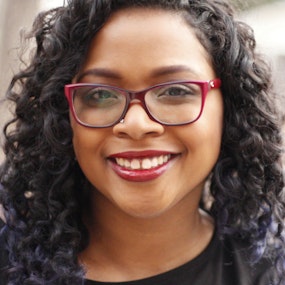
Enola Garland
Executive Director, Colorado AEYC
Enola Garland is the Program and Operations Manager at the Early Childhood Council Leadership Alliance and is also the part-time Executive Director for the Colorado Association for the Education of Young Children. She transitioned to the systems-building side of early childhood education after almost nine years as an early childhood teacher working with children ages 3-5. In 2013, she stumbled into a position as a teacher’s aide in California where she discovered her passion for promoting healthy social-emotional development. Since then, she has worked in a variety of program models, including Head Start and the Colorado Preschool Program, and is certified in the Family Child Care Environmental Rating Scale and the Classroom Assessment Scoring System for Pre-K to 3rd Grade. She considers herself to be a proud and passionate advocate for early childhood and envisions a world where ECE educators are respected, supported, and fairly compensated for the important work that they do.
New to The Exit Interview: A Podcast for Black Educators?
Here are some great episodes to start with.

















